

The scientific report guiding the US dietary guidelines: is it scientific? It has a big impact on the diet of American citizens, and those of most Western nations, so why does the expert advice underpinning US government dietary guidelines not take account of all the relevant scientific evidence?
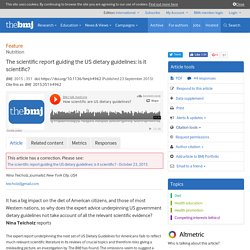
Nina Teicholz reports The expert report underpinning the next set of US Dietary Guidelines for Americans fails to reflect much relevant scientific literature in its reviews of crucial topics and therefore risks giving a misleading picture, an investigation by The BMJ has found. The omissions seem to suggest a reluctance by the committee behind the report to consider any evidence that contradicts the last 35 years of nutritional advice. The guidelines are based on a report produced by a dietary guidelines advisory committee—a group of 11-15 experts who are appointed to review the best and most current science to make nutrition recommendations that both promote health and fight disease.
Saturated fats Low carbohydrate diets New strategies Recommended diets Notes. Pre diabetes. Experts: Eat More Fat. Credit: Iain Bagwell / Getty Images For more than half a century, the conventional wisdom among nutritionists and public health officials was that fat is dietary enemy number one – the leading cause of obesity and heart disease.
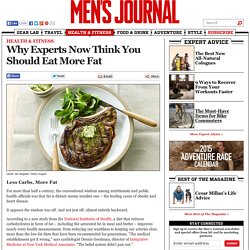
It appears the wisdom was off. And not just off. Almost entirely backward. According to a new study from the National Institutes of Health, a diet that reduces carbohydrates in favor of fat – including the saturated fat in meat and butter – improves nearly every health measurement, from reducing our waistlines to keeping our arteries clear, more than the low-fat diets that have been recommended for generations. Fairly new blog site. Big Sugar's Sweet Little Lies.
Chris Buzelli On a brisk spring Tuesday in 1976, a pair of executives from the Sugar Association stepped up to the podium of a Chicago ballroom to accept the Oscar of the public relations world, the Silver Anvil award for excellence in "the forging of public opinion.

" The trade group had recently pulled off one of the greatest turnarounds in PR history. For nearly a decade, the sugar industry had been buffeted by crisis after crisis as the media and the public soured on sugar and scientists began to view it as a likely cause of obesity, diabetes, and heart disease. Industry ads claiming that eating sugar helped you lose weight had been called out by the Federal Trade Commission, and the Food and Drug Administration had launched a review of whether sugar was even safe to eat.
Consumption had declined 12 percent in just two years, and producers could see where that trend might lead. Worldwide Listings for Primal/Paleo Physician or Healthcare Practitioners. Top 17 Low-Carb & Paleo Doctors With Blogs. Some people give me weird looks when I say something about nutrition that doesn’t fit with the conventional wisdom they have believed all their lives.
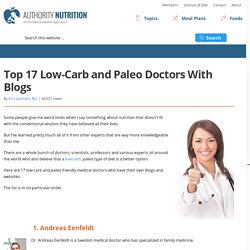
But I’ve learned pretty much all of it from other experts that are way more knowledgeable than me. There are a whole bunch of doctors, scientists, professors and various experts all around the world who also believe that a low-carb, paleo type of diet is a better option. Here are 17 low-carb and paleo friendly medical doctors who have their own blogs and websites. The list is in no particular order. 1. Dr. List Of Low-Carb Doctors. NuSI. 9 Facts That Challenge the Way We Talk About Fat People - Mic. Image Credit: Getty "Muscle weighs more than fat.
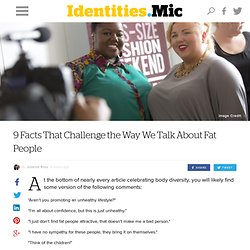
" It's the adage of body-builders everywhere, and, though technically we should say muscle is denser than fat, its message bears repeating: Muscle mass can have a big impact on weight. And yet, body mass index calculations don't distinguish between fat and muscle, nor do they take into account things like a person's frame size. They do, however, draw arbitrarily sharp divisions between what's considered normal, overweight and obese, even though individuals with a lot of lean muscle and little fat could fall into any of these categories. Big Sugar's secret documents echo tobacco tactics. When Cristen Couzens went on the hunt for evidence that Big Sugar had manipulated public opinion, she had no idea what she was doing.
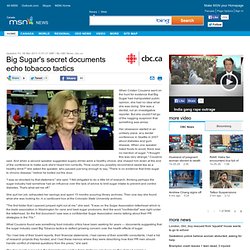
She was a dentist, not an investigative reporter. But she couldn't let go of the nagging suspicion that something was amiss. Her obsession started in an unlikely place, at a dental conference in Seattle in 2007 about diabetes and gum disease. When one speaker listed foods to avoid, there was no mention of sugar. "I thought this was very strange," Couzens said. I Went to the Nutritionists' Annual Confab. It Was Catered by McDonald's. McDonald's sponsored the annual conference of the California branch of the nutritionists' professional organization.
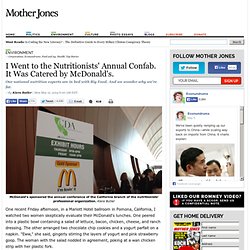
Kiera Butler One recent Friday afternoon, in a Mariott Hotel ballroom in Pomona, California, I watched two women skeptically evaluate their McDonald's lunches. One peered into a plastic bowl containing a salad of lettuce, bacon, chicken, cheese, and ranch dressing. Home. I Went to the Nutritionists' Annual Confab. It Was Catered by McDonald's. The Fat Question: Why fat doesn’t make you fat. There’s a big ol’ myth out there that stubbornly refuses to die.
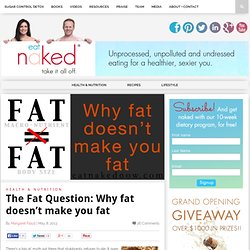
It goes something like this: eating fat makes you fat. From a basic caloric standpoint, this appears to make sense. Fat contains 9 calories per gram, whereas carbohydrates and proteins contain 4 calories per gram. If calories were the only thing to consider, it would stand to reason that if you eat fat, you’re going to gain weight because of the higher caloric load. Well, first off – let’s clear up the calorie myth. So let’s look at exactly what your body is DOING with fat. Why We Got Fatter During The Fat-Free Food Boom : The Salt. Bad Science + Big Business = Obesity Epidemic. Zoë Harcombe; Obesity Researcher, Author The Harcombe Diet.